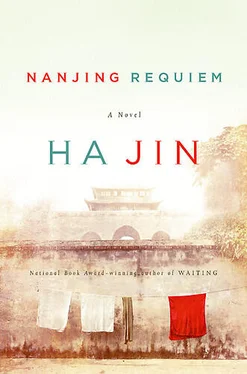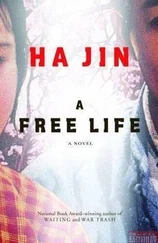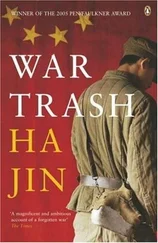Minnie looked bemused. “You shouldn’t let this trouble you so much. She won’t hurt you.”
“She scares me.”
“Now, come on, she’s thin and small. How can she hurt you?”
“She calls him a Jap,” I said, “because she has confused him with some soldier.”
Ban continued, “She always shouts at me, ‘Strike down Little Jap! Go back to your tiny home island.’ ”
“Try to avoid her,” Minnie suggested.
“That won’t help. She tells others I did lots of bad things to girls. She also calls me a brazen pimp.”
I told Minnie, “Some people don’t know her mind was damaged by the Japanese, so they take Ban for a hoodlum.”
“She’s ruining my reputation!” the boy wailed. “I can’t figure out how I offended her. She threatens me at every turn.”
“She sees enemies everywhere,” I added.
“She bullies me,” Ban sniveled.
“Yes, he’s a convenient scapegoat for her,” I said.
At last Minnie seemed to consider this seriously. She asked me, “What do you think we should do?”
“Send her to the mental home.”
“If that place was decent, we might do that. But you know what the lunatic asylum is like. It’s like a prison — it’s being used as a jail. We can’t just throw her into it. I’ll never let that happen.”
“But we cannot keep Yulan on campus forever. She gives us too much extra work and makes everybody tense.”
“I will speak to Shanna about this.”
“She’s another loony.”
“Come on, Anling, we can’t just dump Yulan. You know that will go against the grain with me.”
I exhaled a deep sigh, my cheeks hot. “You’re incorrigible — hopelessly softhearted,” I told her.
I took Ban away, feeling unhappy because Minnie would speak to Shanna before making any decision about Yulan, as though this were an academic matter. On the other hand, I admired Minnie for sticking to her principles.
To everyone’s surprise, Shanna also felt uneasy about the madwoman’s presence on campus now, saying that a lot of students had become unnerved by Yulan, that some were teasing her, inciting her to spew obscenities.
Minnie asked Miss Lou to take responsibility for the crazy girl. The evangelical worker had known Yulan’s mother, who’d died of cirrhosis two years before. Miss Lou agreed to keep Yulan as a helper in relief work since she was dexterous and could sew and knit. As long as she was not provoked, she’d be a fine worker.
Our college gave food and clothes to the destitute in the neighborhood every season, and the donations would be distributed through Miss Lou, who knew which people were in desperate need, so there should be no problem about Yulan’s keep. We felt relieved and also grateful to Miss Lou.
ONE MORNING in early October I found Luhai waiting in my office. He looked anxious but was well dressed as usual, wearing a checkered necktie and leather shoes. He took a folded sheet of paper out of his pants pocket and said to me, “I came across this yesterday evening.”
I skimmed the article. It was a short piece printed on a flyer titled “White Devils, Go Home!” I’d seen similar, though less insulting, writings in recent newspapers — apparently some locals, maybe backed by different political factions, had been campaigning against the foreigners. I put the sheet on the desk and said to Luhai, “Thanks for sharing this.”
“I’m afraid there might be secret moves against our friends,” Luhai said, his high Adam’s apple bobbing.
“Yes, we should let them know. I’ll pass this on to Searle Bates.” I knew that most Americans in town frequented the professor’s house.
Luhai was also worried about how to come by coal for the winter. He had just gotten Minnie’s permission to take down some trees in case the coal from Wuhan didn’t arrive and we had to heat classrooms on the coldest days. The trees on the border of our college’s grounds could be felled by thieves at any time.
Luhai left half an hour later. I liked him better than I had before. I used to think that he was a little callow, probably on account of his young age — twenty-six — but in the past months he seemed to have grown more mature and less talkative. Teachers and students thought well of him, especially the girls, some of whom even had a crush on him, despite his little limp and the fact that he was married and had two small children. Once in a while he spoke at the chapel and taught people hymns. He still talked about how he hated the Japanese. Who could fault him? He’d lost relatives outside Dalian City the previous fall. His cousin, a kung fu master, had defeated a Japanese officer at a sports meet and was celebrated as a local hero. But the next day a platoon of Japanese soldiers went to his home, caught him and his only child, tied them to a tree with iron wire, poured a can of kerosene on father and son, and set them aflame.
The article left by Luhai attacked the foreign men on the former Safety Zone Committee, claiming that they had conspired with the Japanese to oppress and persecute the Chinese, so the neutral zone had never been neutral. The author cited several examples of the Westerners’ collaboration with the invaders, such as disarming the Chinese soldiers and then handing them over to the Imperial Army, attending its celebratory ceremonies and concerts, and teaching Japanese in Christian schools. The article claimed that some of these foreigners often visited the Japanese embassy and even feasted there while making evil plans against China, and that, more outrageously, they’d made a huge profit from selling food to the refugees despite the free rations they had obtained from the former municipality. It was a fact that a white face could serve as a pass and a guarantee of personal safety here. The article singled out Lewis Smythe as a key collaborator, claiming that he’d met with the Japanese officials as often as twice a day. It also highlighted an incident at the police academy when 450 cadets were “betrayed” by the white men. “Those young officers were well equipped with German-made rifles (not handguns), and even their uniforms, helmets, and brass-buckled belts were German in style,” the author wrote. “We all knew how strong and well trained those men were. If they had put up a fight, they could at least have resisted the enemy to earn the precious time for the Chinese army to withdraw fully, or for more of them to break away. But the American missionaries lied to those men and said that the Japanese had granted them clemency, so they all laid down their weapons and capitulated. Later, we saw the Japanese take them through the streets. Most of them were stronger and better fighters than their captors, but they were disarmed and roped together, given the illusion of safety. All had their hands up in the air, and they were marched to the riverside and mowed down by machine guns so that the Japanese could dump them into the water without bothering to bury them. Fellow compatriots, who should be blamed for their stupid deaths and for our tragedy? The American missionaries, who are not our friends but a gang of double-crossers.”
I wondered whether the Communists were behind this article, since they were also eager to see the Americans leave.
When I showed Minnie the flyer, she was not disturbed, having seen this type of attack before. That evening she called on Searle. I accompanied her because I wanted to thank him personally for saving my husband’s life. Yaoping had been depressed ever since we received our son’s letter, and I had urged him to go out and meet some people to ease his mind, so he’d begun frequenting Nanjing University and had even resumed teaching a course in Manchu history there. A week ago, as soon as his class was over, a group of Japanese soldiers arrived and grabbed hold of him, saying he could speak their language and must serve as a part-time interpreter. Obviously someone had ratted on him. As they were dragging him away, Searle appeared and blocked the door, insisting that Yaoping was on the faculty, so as the provisional head of the History Department, he could not release the lecturer to anyone. The leader of the group cursed Searle, but he wouldn’t give in. Finally the Japanese became so angry that they pushed both Searle and Yaoping down the stairs. Seeing the two men lying on the landing, Searle groaning and Yaoping unconscious, they left without him. These days my husband stayed home, too frightened to go to the university again, though he promised he would resume teaching in a week or so.
Читать дальше











